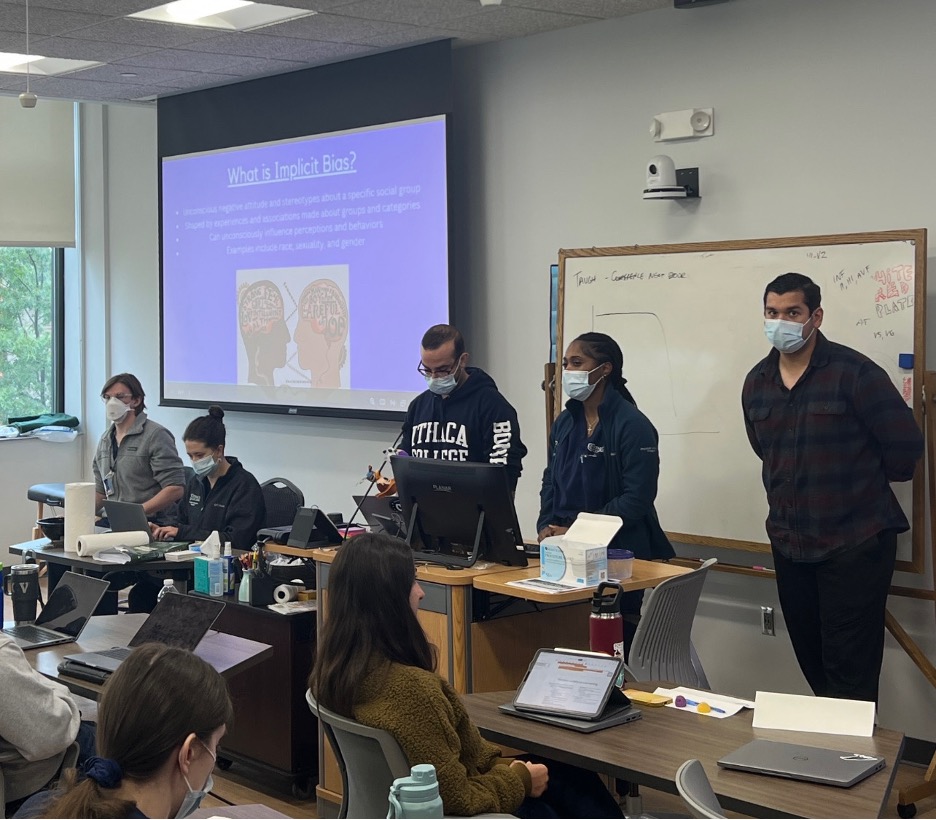Ithaca College PA Students Form a JEDI Committee
At Ithaca College’s School of Health Sciences and Human Performance’s Physician Assistant Studies Program, five students comprise a Justice, Equity, Diversity, and Inclusion (JEDI) committee. The brainchild of founding Program Director, Susan Salahshor, PhD, PA-C, this committee is completely student-run and exists as a space for learners to educate each other outside of the classroom.
I sat down with the JEDI Committee’s current members, Shaunt Korkounian, Oscar Rios, Janiah Lambert, Vanessa Raskin, and Jeremy Weller as well as former committee member, Jordan Beckley, to hear about the work that they do.

The committee members explained how they recognize that every PA student comes from a different background and has different levels of understanding on issues related to equity, diversity, and inclusion. By providing a safe and brave space beyond the classroom to allow for questions and dialogue about these topics, the JEDI committee is able to create a productive learning environment that helps prepare everyone to work with patients from different backgrounds and all walks of life.
Every other month, with the help of the program director and didactic coordinator, an hour and a half of instruction time is turned over to the JEDI committee to lead their peers in a conversation. To determine the topic at hand, they survey their fellow students and rank the topics based on interest.
The hour and a half takes a different shape every time. One of their presentations helped learners work through the differences between equality, equity, and justice. In another, a trans activist EMS worker named Tyler was brought in to talk about his experiences as a trans man in the medical field. Once, the focus was on working as a practitioner within rural communities, as Ithaca college is located in a rural area of upstate New York. They invited a PA who has worked primarily with underserved populations in rural areas such as indigenous communities.
Other examples include implicit bias, the harm of microaggressions, the accessibility of care and more. These student-led, free-flowing conversations supplement the more traditional learning taking place inside the classroom.
The JEDI committee credits their program faculty and staff for helping to create an engaging environment for these discussions to take place. For example, if there is an upcoming test, they will not schedule the JEDI committee for the morning before the test, as they understand that students would be understandably distracted. Instead, the schedule is moved around so that the test can take place in the morning, students can enjoy a full lunch hour, and then reconvene to discuss the topics at hand.
Beyond just their PA program faculty and staff, the JEDI committee mentioned the support they’ve received from the leadership of Ithaca College. The committee was able to present their ideas to the dean and various faculty members as part of a conversation on how a version of the JEDI committee can be integrated into other graduate programs or even with undergraduate students.
The JEDI committee also functions as a place for students to bring up issues they are personally experiencing on campus, anonymously if they wish. Some students reported that certain guest lecturers weren’t adhering to the inclusive language that is used within the program. The JEDI committee discussed how the words that we use are important, especially regarding patients, and decided to raise the concern with program faculty. Their faculty were receptive and made the changes necessary to ensure that all guest lecturers comply with using inclusive language.
The JEDI committee stressed how PA students are hungry for these conversations, despite their intense workload. They consistently pulse-check their peers through surveys and take the feedback they get seriously to ensure a productive dialogue.
Beyond cooperation from their fellow learners, the committee emphasized how crucial it is to receive support from leadership. For PA students who want to see a similar committee find success in their program, the JEDI committee recommends making the case to your program director.




